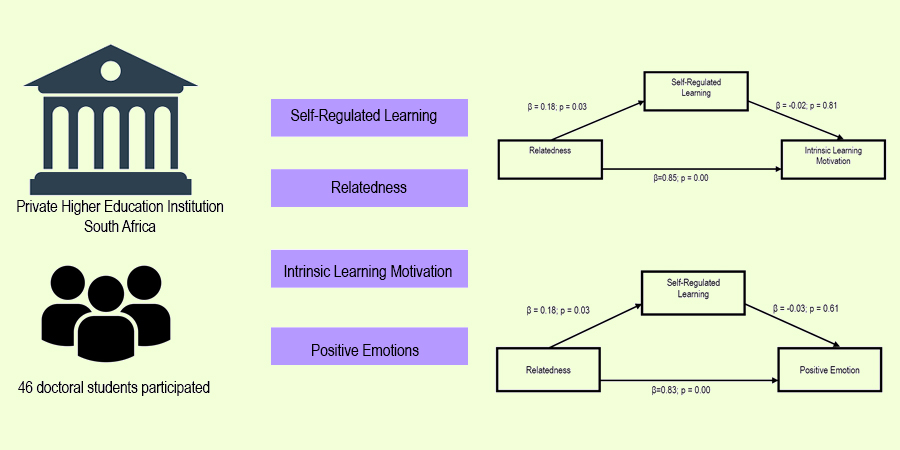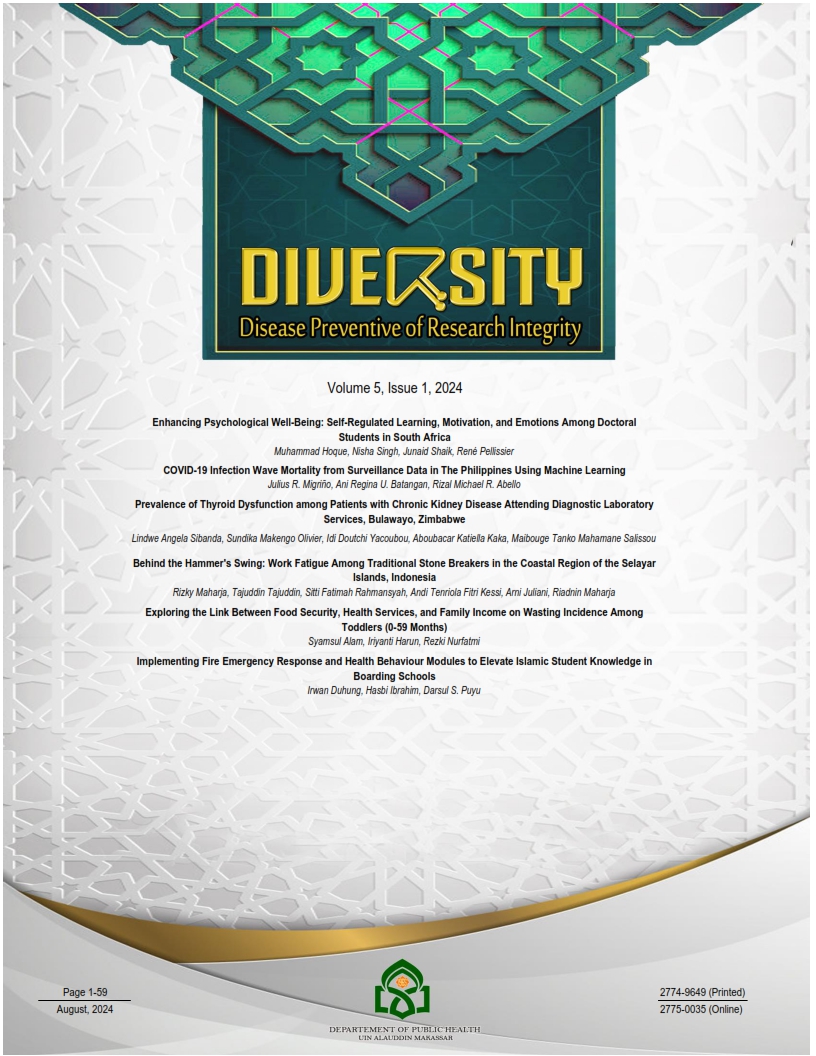Enhancing Psychological Well-Being: Self-Regulated Learning, Motivation, and Emotions Among Doctoral Students in South Africa
Abstract
The likelihood of dropping out and interrupting studies increases with poor psychological well-being (PWB). The promotion of doctoral students' PWB is therefore very important. The aim of this study was to examine how self-regulated learning moderates’ relatedness, intrinsic motivation to learn, and positive emotions in doctoral students at a South African Private Higher Education Institution (PHEI). In this cross-sectional study, 46 doctoral students completed a self-administered anonymous questionnaire using an online platform (QuestionPro). Based on the correlation analysis, relatedness was found to be significantly correlated with intrinsic motivation for learning and self-regulated learning. Self-regulated learning and intrinsic learning motivation were significantly correlated with positive emotion. Regression analysis showed that relatedness was a significant predictor of self-regulated learning. However, self-regulated learning was not a significant predictor of intrinsic learning motivation. Psychological support could be provided to doctoral students by PHEIs through the provision of mental health experts to improve self-regulated learning, relatedness, intrinsic motivation, and positive emotions.

Downloads
References
Ahn, I., Chiu, M. M., & Patrick, H. (2021). Connecting teacher and student motivation: Student-perceived teacher need-supportive practices and student need satisfaction. Contemporary Educational Psychology, 64, 101950. https://doi.org/10.1016/j.cedpsych.2021.101950
Alali, M. A., Robbins, L. B., Ling, J., Kao, T. S. A., & Smith, A. L. (2020). Concept analysis of relatedness in physical activity among adolescents. Journal of Pediatric Nursing, 55, e293-e304. https://doi.org/10.1016/j.pedn.2020.06.005
Autin, K. L., Herdt, M. E., Garcia, R. G., & Ezema, G. N. (2022). Basic psychological need satisfaction, autonomous motivation, and meaningful work: a self-determination theory perspective. Journal of Career Assessment, 30(1), 78-93. https://doi.org/10.1177/10690727211018647
Ben-Eliyahu, A. (2019). Academic emotional learning: A critical component of self-regulated learning in the emotional learning cycle. Educational Psychologist, 54(2), 84-105. https://doi.org/10.1080/00461520.2019.1582345
Börgeson, E., Sotak, M., Kraft, J., Bagunu, G., Biörserud, C., & Lange, S. (2021). Challenges in PhD education due to COVID-19-disrupted supervision or business as usual: A cross-sectional survey of Swedish biomedical sciences graduate students. BMC Medical Education, 21(1), 294. https://doi.org/10.1186/s12909-021-02727-3
Cantarero, K., Van Tilburg, W. A., & Smoktunowicz, E. (2021). Affirming basic psychological needs promotes mental well-being during the COVID-19 outbreak. Social Psychological and Personality Science, 12(5), 821-828. https://doi.org/10.1177/1948550620942708
Castelló, M., Pardo, M., Sala-Bubaré, A., & Suñé-Soler, N. (2017). Why do students consider dropping out of doctoral degrees? Institutional and personal factors. Higher Education, 74, 1053-1068. https://doi.org/10.1007/s10734-016-0106-9
Daniels, L. M., Goegan, L. D., & Parker, P. C. (2021). The impact of COVID-19 triggered changes to instruction and assessment on university students’ self-reported motivation, engagement and perceptions. Social Psychology of Education, 24(1), 299-318. https://doi.org/10.1007/s11218-021-09612-3
Diener, E., Wirtz, D., Tov, W., Kim-Prieto, C., Choi, D. W., Oishi, S., & Biswas-Diener, R. (2010). New well-being measures: Short scales to assess flourishing and positive and negative feelings. Social indicators research, 97, 143-156. https://doi.org/10.1007/s11205-009-9493-y
Edisherashvili, N., Saks, K., Pedaste, M., & Leijen, Ä. (2022). Supporting self-regulated learning in distance learning contexts at higher education level: systematic literature review. Frontiers in Psychology, 12, 792422. https://doi.org/10.3389/fpsyg.2021.792422
Eleftheriades, R., Fiala, C., & Pasic, M. D. (2020). The challenges and mental health issues of academic trainees. F1000Research, 9. https://doi.org/10.12688/f1000research.21066.1
Evans, T. M., Bira, L., Gastelum, J. B., Weiss, L. T., & Vanderford, N. L. (2018). Evidence for a mental health crisis in graduate education. Nature biotechnology, 36(3), 282-284. https://doi.org/10.1038/nbt.4089
Heublein, U., Ebert, J., Hutzsch, C., Isleib, S., König, R., Richter, J., & Woisch, A. (2017). Motive und Ursachen des Studienabbruchs an baden-württembergischen Hochschulen und beruflicher Verbleib der Studienabbrecherinnen und Studienabbrecher. DZHW Projektbericht, 6, 2017.
Holzer, J., Lüftenegger, M., Korlat, S., Pelikan, E., Salmela-Aro, K., Spiel, C., & Schober, B. (2021). Higher education in times of COVID-19: University students’ basic need satisfaction, self-regulated learning, and well-being. Aera Open, 7, 23328584211003164. https://doi.org/10.1177/2332858421100316
Horta, H., Cattaneo, M., & Meoli, M. (2018). PhD funding as a determinant of PhD and career research performance. Studies in Higher Education, 43(3), 542-570. https://doi.org/10.1080/03075079.2016.1185406
Jackman, P. C., & Sisson, K. (2022). Promoting psychological well-being in doctoral students: a qualitative study adopting a positive psychology perspective. Studies in Graduate and Postdoctoral Education, 13(1), 19-35. https://doi.org/10.1108/SGPE-11-2020-0073
Janssen, S., van Vuuren, M., & de Jong, M. D. (2021). Sensemaking in supervisor-doctoral student relationships: revealing schemas on the fulfillment of basic psychological needs. Studies in Higher Education, 46(12), 2738-2750. https://doi.org/10.1080/03075079.2020.1804850
Keller, H. (2016). Psychological autonomy and hierarchical relatedness as organizers of developmental pathways. Philosophical Transactions of the Royal Society B: Biological Sciences, 371(1686), 20150070. https://doi.org/10.1098/rstb.2015.0070
Kern, M. L., Benson, L., Steinberg, E. A., & Steinberg, L. (2016). The EPOCH measure of adolescent well-being. Psychological assessment, 28(5), 586. https://doi.org/10.1037/pas0000201
Levecque, K., Anseel, F., De Beuckelaer, A., Van der Heyden, J., & Gisle, L. (2017). Work organization and mental health problems in PhD students. Research policy, 46(4), 868-879. https://doi.org/10.1016/j.respol.2017.02.008
Li, J., & Wang, R. (2024). Determining the role of innovative teaching practices, sustainable learning, and the adoption of e-learning tools in leveraging academic motivation for students’ mental well-being. BMC psychology, 12(1), 163. https://doi.org/10.1186/s40359-024-01639-3
Maddens, L., Depaepe, F., Raes, A., & Elen, J. (2023). Fostering students’ motivation towards learning research skills: the role of autonomy, competence and relatedness support. Instructional Science, 51(1), 165-199. https://doi.org/10.1007/s11251-022-09606-4
Ntoumanis, N., Ng, J. Y., Prestwich, A., Quested, E., Hancox, J. E., Thøgersen-Ntoumani, C., ... & Williams, G. C. (2021). A meta-analysis of self-determination theory-informed intervention studies in the health domain: Effects on motivation, health behavior, physical, and psychological health. Health psychology review, 15(2), 214-244. https://doi.org/10.1080/17437199.2020.1718529
Oudeyer, P. Y., & Kaplan, F. (2007). What is intrinsic motivation? A typology of computational approaches. Frontiers in neurorobotics, 1, 108. https://doi.org/10.3389/neuro.12.006.2007
Paechter, M., & Maier, B. (2010). Online or face-to-face? Students’experiences and preferences in e-learning. The Internet and Higher Education, 13(4), 292–297. https://doi.org/10.1016/j.iheduc.2010.09.004
Pelikan, E. R., Lüftenegger, M., Holzer, J., Korlat, S., Spiel, C., & Schober, B. (2021). Learning during COVID-19: the role of self-regulated learning, motivation, and procrastination for perceived competence. Zeitschrift für Erziehungswissenschaft, 24(2), 393-418. https://doi.org/10.1007/s11618-021-01002-x
Pramanik, S., & Khuntia, R. (2023). Decoding Unconditional Self-Acceptance: A Qualitative Report. Journal of Rational-Emotive & Cognitive-Behavior Therapy, 41(4), 932-949. https://doi.org/10.1007/s10942-023-00517-y
Printer, L. (2023). Positive emotions and intrinsic motivation: A self-determination theory perspective on using co-created stories in the language acquisition classroom. Language Teaching Research, 13621688231204443. https://doi.org/10.1177/13621688231204443
Pyhältö, K., Tikkanen, L., & Anttila, H. (2023). The influence of the COVID-19 pandemic on PhD candidates’ study progress and study wellbeing. Higher Education Research & Development, 42(2), 413-426. https://doi.org/10.1080/07294360.2022.2063816
Riggenbach, A., Goubert, L., Van Petegem, S., & Amouroux, R. (2019). Topical Review: Basic Psychological Needs in Adolescents with Chronic Pain—A Self‐Determination Perspective. Pain Research and Management, 2019(1), 8629581. https://doi.org/10.1155/2019/8629581
Skinner, E. A., Kindermann, T. A., Vollet, J. W., & Rickert, N. P. (2022). Complex social ecologies and the development of academic motivation. Educational Psychology Review, 34(4), 2129-2165. https://doi.org/10.1007/s10648-022-09714-0
Tomás-Miquel, J. V., Expósito-Langa, M., & Nicolau-Juliá, D. (2016). The influence of relationship networks on academic performance in higher education: a comparative study between students of a creative and a non-creative discipline. Higher Education, 71, 307-322. https://doi.org/10.1007/s10734-015-9904-8
Van den Broeck, A., Ferris, D. L., Chang, C. H., & Rosen, C. C. (2016). A review of self-determination theory’s basic psychological needs at work. Journal of management, 42(5), 1195-1229. https://doi.org/10.1177/0149206316632058
Van den Broeck, A., Vansteenkiste, M., De Witte, H., Soenens, B., & Lens, W. (2010). Capturing autonomy, competence, and relatedness at work: Construction and initial validation of the Work‐related Basic Need Satisfaction scale. Journal of occupational and organizational psychology, 83(4), 981-1002. https://doi.org/10.1348/096317909X481382
van Rooij, E., Fokkens-Bruinsma, M., & Jansen, E. (2021). Factors that influence PhD candidates’ success: the importance of PhD project characteristics. Studies in Continuing Education, 43(1), 48-67. https://doi.org/10.1080/0158037X.2019.1652158
van Tienoven, T. P., Glorieux, A., Minnen, J., Te Braak, P., & Spruyt, B. (2022). Graduate students locked down? PhD students’ satisfaction with supervision during the first and second COVID-19 lockdown in Belgium. Plos one, 17(5), e0268923. https://doi.org/10.1371/journal.pone.0268923
Vanslambrouck, S., Zhu, C., Pynoo, B., Lombaerts, K., Tondeur, J., & Scherer, R. (2019). A latent profile analysis of adult students’ online self-regulation in blended learning environments. Computers in Human Behavior, 99, 126-136. https://doi.org/10.1016/j.chb.2019.05.021
Vansteenkiste, M., Ryan, R. M., & Soenens, B. (2020). Basic psychological need theory: Advancements, critical themes, and future directions. Motivation and emotion, 44(1), 1-31. https://doi.org/10.1007/s11031-019-09818-1
Yıldırım, M., Aziz, I. A., Vostanis, P., & Hassan, M. N. (2024). Associations among resilience, hope, social support, feeling belongingness, satisfaction with life, and flourishing among Syrian minority refugees. Journal of Ethnicity in Substance Abuse, 23(1), 166-181. https://doi.org/10.1080/15332640.2022.2078918
Copyright (c) 2024 Muhammad Hoque, Nisha Singh, Junaid Shaik, René Pellissier

This work is licensed under a Creative Commons Attribution-NonCommercial-ShareAlike 4.0 International License.
Authors retain copyright and grant the journal right of first publication with the work simultaneously licensed under a Creative Commons Attribution-NonCommercial-ShareAlike 4.0 International License that allows others to share the work with an acknowledgment of the work's authorship and initial publication in this journal.
Authors are able to enter into separate, additional contractual arrangements for the non-exclusive distribution of the journal's published version of the work (e.g., post it to an institutional repository or publish it in a book), with an acknowledgment of its initial publication in this journal.
Authors are permitted to publish their work online in third parties as it can lead to wider dissemination of the work.




